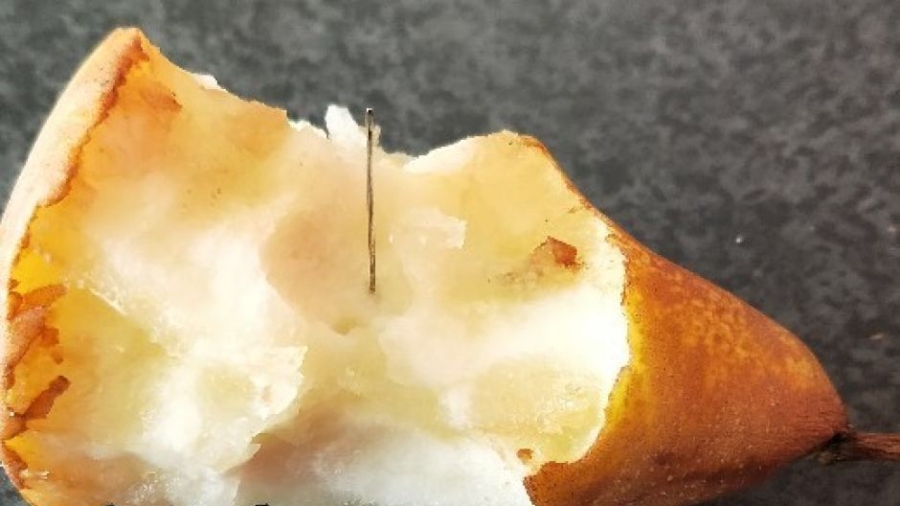Two months after Australia’s first reported case of fruit tampering by needles, a woman in Melbourne’s southeast found a needle embedded inside a pear on Nov. 13.
Clare Bonser told the Australian Broadcasting Corporation that she had purchased the pear from Woolworths in Berwick over the weekend and found the needle when she bit into the pear on Nov. 13. “I was just chomping on it and for some reason, happened to look down before the next bite and saw it,” she said.
The discovery came just days after a 50-year-old Queensland woman My Ut Trinh was arrested for contaminating strawberries with needles at a Queensland strawberry farm following a two-month police investigation.
The strawberry contamination crisis that followed saw reports of contaminated strawberries in every state and territory by September. Most cases were suspected copycats. By September, the needle contamination had also spread to other fruit including incidents with a mango, a banana and an apple.
Strawberry-Needle Woman Arrested
Police were able to charge Trinh after her DNA was found in a contaminated punnet of strawberries that had reached the shelves of a Victorian supermarket. She was arrested by police on Nov. 11.
Police said on Nov. 12 that they had charged Trinh with seven cases of contamination—the first charges laid in the case. Her legal representative withdrew a bail application. Trinh is to remain in custody ahead of her next appearance on Nov. 22, court officials said.
Police alleged that Trinh had the intention to cause economic loss through her actions, which may result in a conviction of up to 10 years in prison.
Trinh’s actions in September had triggered a spate of suspected copycat incidents across the country. This, in turn, forced major supermarkets to pull strawberry punnets from shelves and Australian farmers to dump their strawberries by the truckload.
Strawberry Growers Say Social Media Fueled Crisis
Strawberry growers welcomed the news of Trinh’s arrest and blamed social media for the crisis.
“It was a crisis driven by social media and the only real victims were the strawberry growers, and to some extent other Australian fruit growers and exporters,” the Queensland Strawberry Growers Association (QSGA) said in a statement.
Social media was later employed to counter the crisis, when the tag #SmashaStrawb emerged as people encouraged each other to support farmers by continuing to buy strawberries.
Social media lights up with inventive #SmashaStrawb strawberry recipes https://t.co/zhzGrWvH3t
— ABC News (@abcnews) September 19, 2018
Government Intervention
The Queensland government announced a $1 million strawberry support package in September in response to the strawberry contamination crisis. As part of the package, they ran a statewide advertising campaign costing about $600,000 to encourage people to support local farmers by buying their produce.
Another $250,000 of the $1 million package was put towards ensuring there were no more such cases of contamination in the supply chain. QSGA and Growcom were also given some funds to distribute to affected farmers.
The federal government also pumped $1 million of relief money into the industry and announced on Sept. 19 that it would draft new laws to increase the maximum penalty for food tampering from 10 to 15 years.
Anyone with information is asked to contact Policelink on 131 444 or provide information using the online form 24hrs per day. You can report information about crime anonymously to Crime Stoppers, a registered charity and community volunteer organisation, by calling 1800 333 000 or via crimestoppersqld.com.au 24 hrs per day.
Storyful and Reuters contributed to this report.

